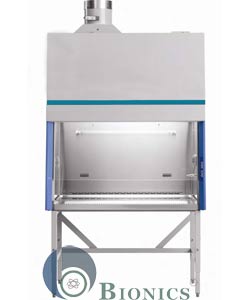The Blog on microbiological safety cabinet
The Blog on microbiological safety cabinet
Blog Article
Class 2 Biosafety Cabinets: Essential Equipment for Laboratory Safety and Microbiological Containment

Maintaining a safe lab environment is crucial in today’s advanced research and clinical setups. Whether it's conducting biological tests, diagnostics, or experiments with infectious agents, biosafety cabinets form the backbone of contamination control.
Class 2 Biosafety Cabinets are widely adopted for offering three-way protection. These units are indispensable tools for pathogen handling and biological research.
Biosafety Cabinets – How They Work and Why They Matter
Biosafety cabinets are airflow-controlled workspaces engineered for microbiological safety. They use high-efficiency filters to purify air entering and leaving the cabinet.
These units are generally classified into three main types: Class I, II, and III based on containment level. Among these, Class 2 biosafety cabinets are the standard choice for most applications.
Why Class II Cabinets Are the Preferred Choice in Labs
Class 2 Biosafety Cabinets ensure safety on all fronts—personnel, workspace, and biological material. They generate a vertical airflow that reduces turbulence and contamination.
Contaminated air is drawn into the cabinet and filtered through HEPA systems before recirculation or exhaust. These cabinets are suited for clinical, research, and pharmaceutical lab applications.
Key Features of Microbiological Safety Cabinets
A Class 2 microbiological safety cabinet includes several critical technologies such as:
• High-efficiency air filters to ensure clean workspace air
• Steady air movement to reduce airborne particle circulation
• Pressure differentials that maintain internal containment
• Optional UV lights for overnight sterilisation
• Low sound emissions to reduce fatigue
• Front glass for full control and protection
These elements support lab workers in maintaining sterile working environments.
Applications in Research and Healthcare
Class 2 Biosafety Cabinets are commonly used across microbiology, biotechnology, diagnostics, and pharma. They are indispensable for handling clinical specimens, blood cultures, and biological reagents.
Hospitals, research labs, and manufacturing units depend on these cabinets for contamination control.
Advantages of Installing Class 2 Cabinets in Your Lab
Using Class 2 cabinets offers multiple advantages including operator protection and experimental reliability:
• Protects the integrity of lab work
• Shields operators from harmful aerosols and pathogens
• Minimises lab contamination and pollution risks
These cabinets combine safety features with operational efficiency.
Cabinet Types and Global Compliance
Top manufacturers build Class 2 cabinets in accordance with strict international guidelines. Class 2 units are sub-classified as A1, A2, B1, and B2—each with distinct airflow and exhaust features.
• Type A2: Recirculates 70% and exhausts 30% of filtered air
• Type B2: Exhausts Biosafety Cabinets 100% of air via ducting; no recirculation
Selecting the right configuration ensures compliance and safety.
Tips for Purchasing the Ideal Biosafety Cabinet
Before purchasing, consider:
• The biosafety level required (BSL-1, BSL-2, or BSL-3)
• Available lab space and utility infrastructure
• Operational costs and technical support options
• Warranty, training, and certification services
Partnering with a trusted provider helps meet both performance and safety needs.
Best Practices for Using Class II Biosafety Cabinets
For optimal results:
• Avoid placing near doors, vents, or fans
• Ensure annual certification and airflow testing
• Educate staff on cabinet operations and safety
Operational best practices include:
• Always wear appropriate lab PPE
• Work calmly to prevent airflow disturbances
• Clean all contact points post-operation
• Treat UV usage as an overnight sterilisation method
Why Class 2 Cabinets Are a Must-Have in Labs
Class 2 biosafety cabinets are a cornerstone of any safe, efficient laboratory. They ensure contamination-free experiments and personnel safety.
From clinical research to vaccine development, Class II cabinets maintain sterility in sensitive procedures. When investing in a biosafety cabinet, opt for trusted brands that offer end-to-end service—because your research deserves the best protection. Report this page